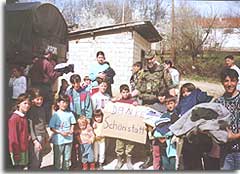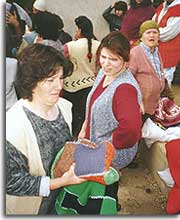 |
| "Danke, Schönstatt!" hatten einige Kinder
auf ein Pappschild geschrieben "Thank you Schoenstatt" - written on a cardbord by some of the children |
 |
 |
|
Cloths and
blankets were passed on to refugees in Kosovo |
| Fotos: Knes, Chile © 2001 |
(mkf) Groups of the Schoenstatt Movement in Borken, Northern Germany, donated clothes and toys for refugee families in Kosovo; they were given to 55 families whose hometown was completely destroyed and who are now living in makeshift shelters.
A donation of altogether more than 500 kilogram were passed on to the families in Kosovo through Officer Charly Olbing (KFOR), whose wife works in the pilgrims’ office in the Schoenstatt Center, Borken. Her initiative was the incentive for the Schoenstatt family’s donation for the Kosovo refugees. About 300 people whose home town was completely burned down and destroyed are living in the little village where the convoy of the KFOR troops took the donated clothes and toys from Borken. Worse than the conditions in the makeshift shelters are the physical and emotional consequences of war, flight, and injuries. Many of the people, and especially the children, suffer from handicaps and injuries caused by land mines, and gunfire. "You see the terrible memories written in their faces," said Charly Olbing, "They won’t forget. Many of them don’t dare to trust anybody." Most of the children don’t remember anything but war. To especially give a little joy to them was one of the major objectives of the Schoenstatt members and friends in Borken.
"Thank you, Schoenstatt!"
More efforts than expected were necessary to pass on the clothes, blankets, and toys from Borken: "You need special trucks and vehicles, personnel, a day fitting for the people and at least four hours of time - that’s not easy to co-ordinate here. Many of the KFOR soldiers are tired and already work extra shifts." A cardboard message reading "Thank you, Schoenstatt" was more that the obligatory sign of politeness. "These people don’t have anything to wear but what they receive from donations," said Charly Olbing. A boy invited him for a cup of coffee in the name of his mother and grandfather. "They want to show their gratitude." The joy and gratitude of the refugees rewarding Charly Olbing and his soldiers, as well as the Schoenstatt members in Borken, will be a lasting memory for all of them.